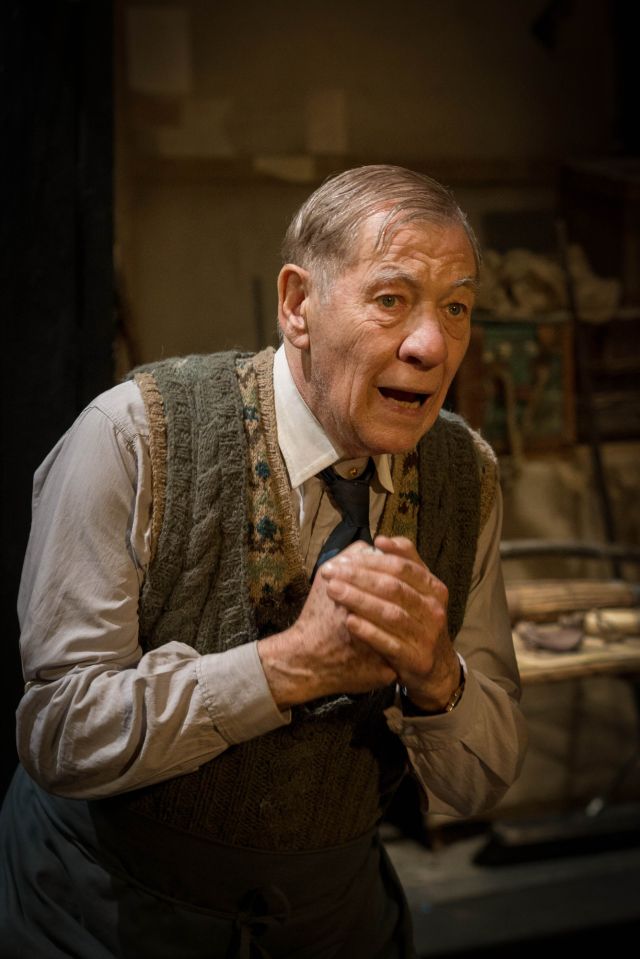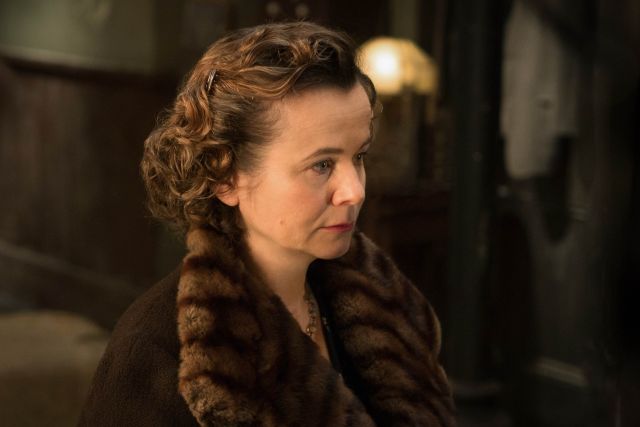The prospect of Ian McKellen and Anthony Hopkins acting together for the first time in their storied careers in Richard Eyre's BBC adaptation of The Dresser was one of those mouth-watering propositions to sit alongside DeNiro and Pacino on screen in Heat and the stage reunion of Dames Maggie Smith and Judi Dench in The Breath of Life.
And if the rather lopsided result of this latest version of a Ronald Harwood play, already made into an Oscar-nominated film in 1983, saw to it that McKellen came up trumps, that may be in the nature of the piece itself: McKellen's Norman (pictured below) is in fact the theatrical dresser of the title, so far be it from this wily veteran not to look a gift horse in the mouth.
 The same part was long associated with Tom Courtenay, who premiered the role in London and on Broadway (where I first saw the play in 1981 with Courtenay appearing alongside the late and much-missed Paul Rogers) and then reprised it for Peter Yates's film. Albert Finney at that point took on the role of the ageing, cantankerous Sir, a thespian grandee said to have been modeled on Donald Wolfit.
The same part was long associated with Tom Courtenay, who premiered the role in London and on Broadway (where I first saw the play in 1981 with Courtenay appearing alongside the late and much-missed Paul Rogers) and then reprised it for Peter Yates's film. Albert Finney at that point took on the role of the ageing, cantankerous Sir, a thespian grandee said to have been modeled on Donald Wolfit.
But as Peter Hall's 2005 West End revival of this play proved, no part need remain the province of a single actor forever, Nicholas Lyndhurst in that staging locating a suppressed anger that was utterly distinct from the defining feyness Courtenay brought to the role. McKellen is something else yet again: a prim, physically indrawn prattler who is very possibly not in full possession of his wits for all that he worries about the mentally wayward Sir. Playing one of life's apprentices –someone, in other words, born not to seize the spotlight but to serve – McKellen scoops up this handsomely made version from director-adaptor Richard Eyre and could well run with it all the way to the Baftas.
Eyre seems to be going through a phase of peering inside the workings of his own profession, The Dresser airing the same week that the former National Theatre artistic director has transferred his production of Mr Foote's Other Leg into the West End, Ian Kelly's play shining its own spotlight on a vanished era of the English stage. Eyre's clear-eyed affection for the piece was evident from its burnished, period-perfect hues (the elegant camerawork was thanks to Ben Smithard) and from his work with a cast comprised of multiple collaborators of old, Eyre and McKellen having delivered a famous Fascist-themed Richard III many years ago.
The surprise as regards The Dresser is that Hopkins – a onetime Lear for the National – didn't seem more convincing in the snatches we saw of him as the mad monarch, the paper-thin narrative of the piece hanging on whether the fretful Sir will put aside his anxieties and don his beard in time for a performance that a wartime audience receives with rapture (no surprise there), the ambient sound of air raid sirens and the like be damned. "We can't play King Lear without the King," or so remarked Her Ladyship, aka Sir's wife (a firm-voiced Emily Watson, pictured below), which was characteristic of a script that spends a fair amount of time grandly announcing the obvious. Or settling for the hammy on the way to an ending that is entirely preordained.
 Most of the supporting assignments were one-note affairs, the creators' primary interest clearly lying in the symbiotic interplay between Sir and Norman as a kind of WWII-era Lear and his Fool: an overworked affinity in this piece that has always made one aware how fully The Dresser needs to piggyback on its Shakespearean forbear to achieve what power comes its way. One felt vaguely sorry for Vanessa Kirby doing little more than resist Sir's advances, while Sarah Lancashire (so good in Eyre's stage musical Betty Blue Eyes) embodied long-suffering patience from the sidelines as the doting stage manager, Madge.
Most of the supporting assignments were one-note affairs, the creators' primary interest clearly lying in the symbiotic interplay between Sir and Norman as a kind of WWII-era Lear and his Fool: an overworked affinity in this piece that has always made one aware how fully The Dresser needs to piggyback on its Shakespearean forbear to achieve what power comes its way. One felt vaguely sorry for Vanessa Kirby doing little more than resist Sir's advances, while Sarah Lancashire (so good in Eyre's stage musical Betty Blue Eyes) embodied long-suffering patience from the sidelines as the doting stage manager, Madge.
In the end, the appeal lay in the dynamic between two septuagenarian acting titans (McKellen has himself done Lear on stage), only for the sidekick to command centre-screen at every turn. And if it was the garrulous, faintly creepy Norman who pierced the heart as has often been The Dresser's way, I can't imagine any of the fine men who have played this role better positioned than McKellen to speak a newly coined verb like "minioning" and – if TV were in fact the theatre – bring down the house.















Add comment